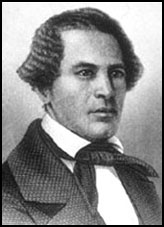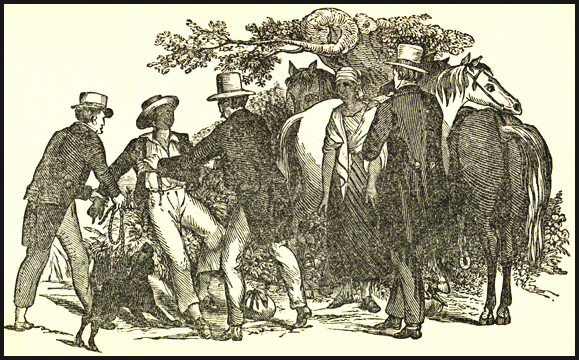
- William Wells Brown
William Wells Brown was born near Lexington, Kentucky, in 1814. His father was George Higgins, a white plantation owner, but his mother was a black slave. “My mother’s name was Elizabeth. She had seven children, Solomon, Leander, Benjamin, Joseph, Millford, Elizabeth, and myself. No two of us were children of the same father.”
As a house slave he was better treated than the field workers: “I was a house servant – a situation preferable to that of a field hand, as I was better fed, better clothed, and not obliged to rise at the ringing of the bell, but about half an hour after.”
When he was a child his master moved to Saint Charles, Missouri. “My master owned about forty slaves, twenty-five of whom were field hands… in addition to his practice as a physician, he carried on milling, merchandising and farming. He had a large farm, the principal productions of which were tobacco and hemp. The slave cabins were situated on the back part of the farm, with the house of the overseer, whose name was Grove Cook, in their midst.”
William continued as a house slave but was distressed about the punishment of the field workers: “Though the field was some distance from the house, I could hear every crack of the whip, and every groan and cry of my poor mother. I remained at the door, not daring to venture any further. The cold chills ran over me, and I wept aloud. After giving her ten lashes, the sound of the whip ceased, and I returned to my bed, and found no consolation but in my tears. Experience has taught me that nothing can be more heart-rending than for one to see a dear and beloved mother or sister tortured, and to hear their cries, and not be able to render them assistance.”
William’s master moved to St. Louis: “My mother was hired out in the city, and I was also hired out there to Major Freeland, who kept a public house. He was formerly from Virginia, and was a horse-racer, cock-fighter, gambler, and withal an inveterate drunkard. There were ten or twelve servants in the house, and when he was present, it was cut and slash – knock down and drag out. In his fits of anger, he would take up a chair, and throw it at a servant; and in his more rational moments, when he wished to chastise one, he would tie them up in the smoke-house, and whip them; after which, he would cause a fire to be made of tobacco stems, and smoke them.”
William decided to become a runaway. “I complained to my master of the treatment which I received from Major Freeland; but it made no difference. He cared nothing about it, so long as he received the money for my labor. After living with Major Freeland five or six months, I ran away, and went into the woods back of the city… One day, while in the woods, I heard the barking and howling of dogs, and in a short time they came so near that I knew them to be the bloodhounds of Major Benjamin O’Fallon. He kept five or six, to hunt runaway slaves with… As soon as I was convinced that it was them, I knew there was no chance of escape. I took refuge in the top of a tree, and the hounds were soon at its base, and there remained until the hunters came up in a half or three quarters of an hour afterwards.”

- Brown and his mother captured after attempting to escape from
slavery. Illustration in Narrative of William W. Brown (1847)
William was severly punished for trying to escape slavery: “After we returned home, I was tied up in the smoke-house, and was very severely whipped. After the major had flogged me to his satisfaction, he sent out his son Robert, a young man eighteen or twenty years of age, to see that I was well smoked. He made a fire of tobacco stems, which soon set me to coughing and sneezing. This, Robert told me, was the way his father used to do to his slaves in Virginia. After giving me what they conceived to be a decent smoking, I was untied and again set to work.”
William was eventually hired by Elijah P. Lovejoy, who was at that time publisher and editor of the St. Louis Times. “My work, while with him, was mainly in the printing office, waiting on the hands, working the press, etc. Mr. Lovejoy was a very good man, and decidedly the best master that I had ever had. I am chiefly indebted to him, and to my employment in the printing office, for what little learning I obtained while in slavery.”
In 1834 he managed to escape to Dayton, Ohio, where he was helped by Wells Brown, a Quaker. He later recalled in his autobiography, Narrative of William W. Brown, A Fugitive Slave (1847): “He was a devoted friend of the slave; but was very old, and not in the enjoyment of good health. After being by the fire awhile, I found that my feet had been very much frozen. I was seized with a fever, which threatened to confine me to my bed. But my friends soon raised me, treating me as kindly as if I had been one of their own children. I remained with them twelve or fifteen days, during which time they made me some clothing, and the old gentleman purchased me a pair of boots… Before leaving this good Quaker friend, he inquired what my name was besides William. I told him that I had no other name.” He replied “Since thee has got out of slavery, thee has become a man, and men always have two names.” William therefore decided to adopt the name of the man who saved him.
Brown became a conductor on the Underground Railroad and worked on a Lake Erie steamer ferrying slaves to freedom in Canada.
In 1843 Brown became a lecturing agent for the New York Anti-Slavery Society. After obtaining a reputation as one of the movement’s best orators, Brown was employed by the American Anti-Slavery Society where he worked closely with William Lloyd Garrison and Wendell Phillips.
Brown, who settled in Boston, published his autobiography, Narrative of William W. Brown, A Fugitive Slave, in 1847. He obtained a living lecturing on slavery and temperance reform in America and Europe. This inspired his book, Three Years in Europe (1852). In 1853 Brown published Clotel, a story about Thomas Jefferson’s relationship with a slave mistress Sally Hemings. The book is believed to be the first novel to be published by an African-American. Brown also wrote a play, The Escape (1858) and several historical works including The Black Man (1863), The Negro in the American Revolution (1867), The Rising Son (1873) and another volume of autobiography, My Southern Home (1880).
William Wells Brown died on the 6th November, 1884, in Chelsea, Massachusetts